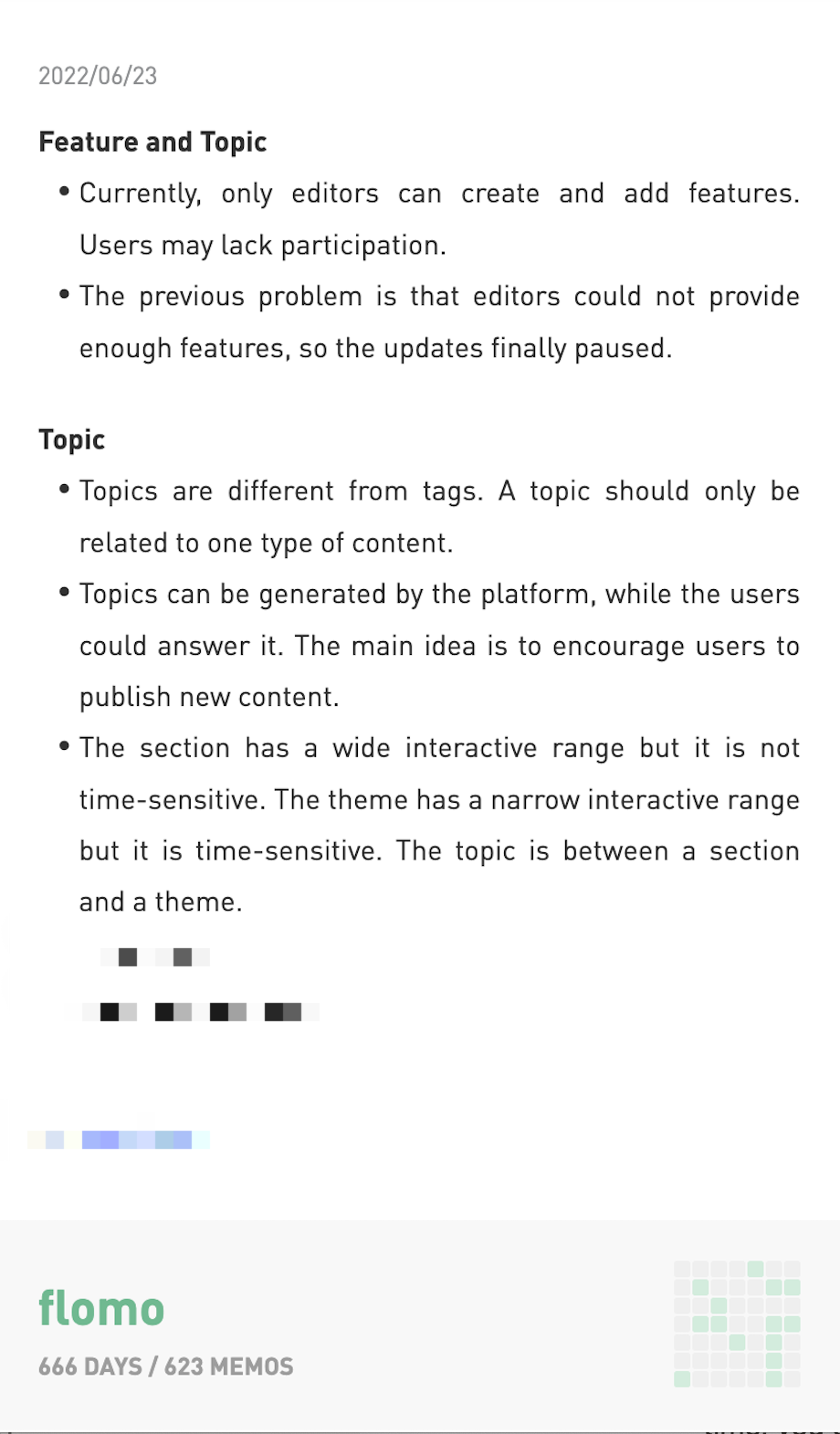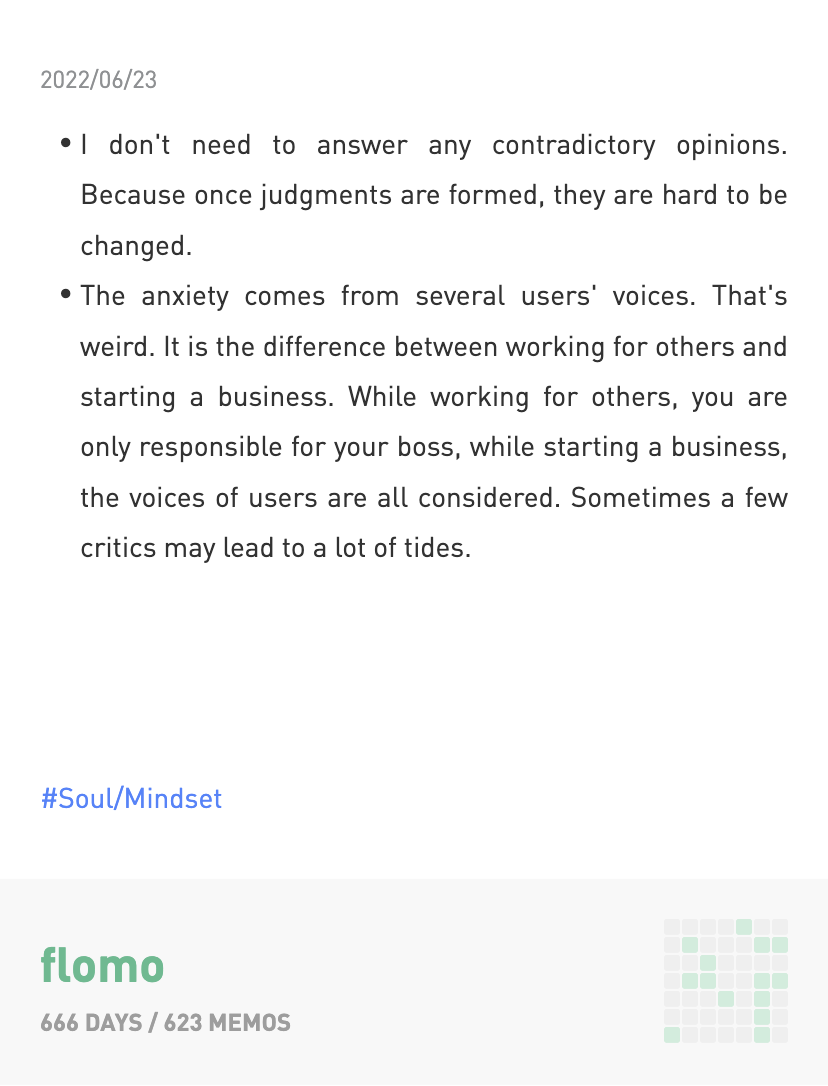🌠What is the Meaning of Review?
The feature mentioned: Daily Review
#The relation between review and memory
Hoarding things is like the nature of humans. No matter what it is, food or information, human beings are tending to hoard it. It is the gene flowing in our blood. However, memory is a voluntary action. We need to make efforts to remember things.
The ability of memory is the core of a person. It can be divided into two types:
The memory of the Past: things that happened in the past, e.g. what lesson we have learned.
The memory of the Future: things are going to happen, e.g. who we are going to meet tomorrow.
While Memory of Past includes:
Implicit memory: the memory of skills, e.g. brushing teeth
Declarative memory or explicit memory: the memory of facts and meanings, or the memory of events
Okay, quick quiz time. Picture the logo of Apple Inc. in your mind. Can you describe it exactly? Why is it not easy to draw it correctly? Because though we see it often, we are not familiar with its coding. The process of memory is:
Encode: input information to our brain
Storage: save information in our brain
Retrieval: extract appropriate information when necessary
So when we store the information without proper encoding, we may find slight differences while retrieving it. If we want to have better memory, we need to improve these three abilities.

How to better store information?
Have enough sleep: a longer nap can lead to the sleep stage of consolidating memories
Practice and review regularly: the Daily Review of flomo is designed according to this rule
How to better retrieve information?
Associational memory: use association to build connections among information
Proper anticipation: predict the information needed
Deliberate practice: recall the connections regularly to deepen the memory
# How to improve decision-making ability?
Set a tag about decisions, and write down a simple but clear decision-making process under it. By setting the range of this tag, you can review the scenario of each decision, and annotate the decision-making process with the knowledge you have today. In this way, you can improve your decision-making ability.
Here I’d like to recommend to you a book named Decision-making Mindset written by Jialing Wang. In this book, the decision is defined as “Decision is a series of decisions which have long-term impacts and a series of resources allocation towards one goal”. So making a decision is not an impulse but a scientific process, and you can improve it by deliberate practice.
Besides a specific goal, there are another two premises in order to improve decision-making ability:
Write down your decision-making process. If you don’t, you can hardly review it in the future.
Review your decision-making process regularly. If you don’t, then the recording means nothing.
Take me as an example. At that time, I was undergoing the product design of a community. I met a certain problem that is the traditional Bulletin Board System is not flexible. I wrote down a few thoughts at that time. But as we have mentioned, the premise of making a decision is to collect enough information. So I waited for days and then tried to override these thoughts from another perspective. I kept asking myself “what if I don’t do these?”

After this design was onboarded, I didn’t see the anticipated result. So I reviewed my decision-making process recorded at that time, and I found a few points I overlooked. But without these records and reviews, constantly adding features will lead to rubbish. It is also true in our life.
#How to review your emotions?
Ecstacy depends on one or two exciting moments, while happiness depends on a series of small things. By recording the small things making you happy and reviewing them from time to time, you can improve your happiness and avoid the vicious circle of emotions.
In the book Mindfulness: A practical guide to finding peace in a frantic world, it is said that sometimes we are so busy that we make decisions unconsciously, just like an autopilot vehicle on the highway. We say yes to something without thinking; we feel furious about something without any rational control. We are flooded by the noise of thoughts. It seems like we have made decisions, but those are impulses without any thinking.
I have been troubled by such a reaction for some time. But I didn’t know it until a friend of mine reminded me of being emotional. I suddenly realized how aggressive I was. I found one MEMO from the Daily Review of flomo the other day. Now I don’t know whether laugh or cry. Why did I become so sensitive, anxious, and pessimistic?

If you are also troubled by emotions, you can record emotions and relevant thoughts on flomo when you are aware of them. It doesn’t have to be negative thoughts or emotions. You can record everything. I have a tag named #Soul/Happiness. Then you can set a rule of Daily Review, and then when you are reviewing these MEMOs, you will know how much you have grown or changed. You may also understand more about who you are, and who you are willing to be.
By constantly reviewing and facing the tides of emotions, you will reach the land of peace with all your efforts.
Last updated